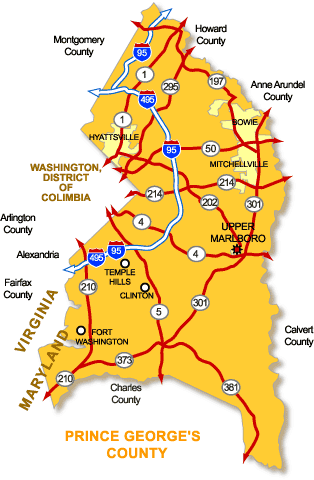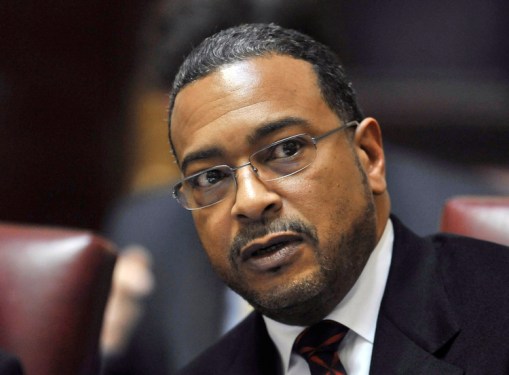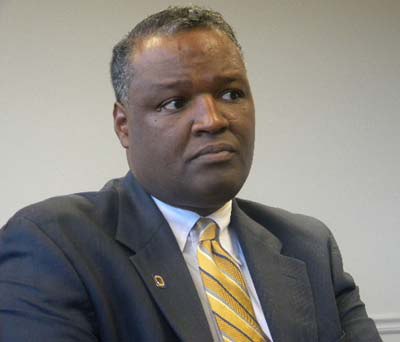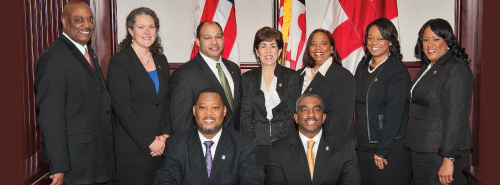The council reconvened at 8:30 p.m., with Deni Taveras (D-Adelphi) absent, and voted 8 to 0 to kill each of Baker’s 32 line-item vetoes, restoring the budget they passed on May 28, 2015.
The Prince George’s County Council voted Tuesday to override budget vetoes handed down by County Executive Rushern L. Baker III, rejecting for the second time in three weeks a proposed double-digit increase in the property tax rate.
The decision illustrates a stark shift by the nine-member council, which has supported most of Baker’s major initiatives throughout his 4 1 /2 years in office.
It reflects concern among lawmakers about increasing the tax burden on the county’s residents, who already are taxed more than residents of neighboring jurisdictions and were hit hard by the recession and foreclosure crises. And it demonstrates skepticism of Baker’s theory that an infusion of money into the troubled public school system will catapult it from the bottom of state rankings to the top over the next five years.
[Can a tax hike save a school system?]
Baker (D) said he vetoed parts of the council-approved budget for two reasons: Because he thinks more spending for schools is vital to the county’s future and because he thinks that the council acted illegally by trimming his budget request by more than 1 percent.
Council members say the second rationale is based on a misinterpretation of a 2006 law that addresses the council’s ability to adjust revenue projections — not budget appropriations.
Baker’s interpretation “is wrong and would unconstitutionally erode our system of checks and balances and give the county executive the near-unlimited power to raise taxes,” said Mel Franklin (D-Upper Marlboro), the council’s chairman.
[Baker: Council’s budget isn’t legal]
Baker waited until a 5 p.m. deadline Tuesday to send his vetoes to the council, long after lawmakers’ legislative session was scheduled to have ended.
The council reconvened at 8:30 p.m., with Deni Taveras (D-Adelphi) absent, and voted 8 to 0 to kill each of Baker’s 32 line-item vetoes, restoring the budget they passed on May 28.
The council’s overrides reinstate a 4-cent increase in the property tax rate. Baker had originally proposed a 15-cent increase, then floated an 11.45-cent increase on Monday.
Although the amount is significantly smaller than what Baker sought, it would be the first property tax increase in Prince George’s in nearly four decades — a blow to anti-tax activists who pushed through a tax cap in 1978 and have defended it ever since.
Lawmakers also overrode Baker’s veto of a 1.5-cent increase in the Prince George’s park and planning tax.
What happens next is unclear. Citizens could go to court to challenge the county’s decision to raise property taxes.
And Baker said Monday that the council’s override could be vulnerable to legal challenge as well, based on his contention that county law prohibits the council from adjusting the budget up or down by more than 1 percent.
Franklin called Baker’s discussion of litigation “embarrassing and strange” for the county as well as “self destructive and self-defeating.”
“Hopefully, the county executive will not go down that road.”
If no one challenges the budget, the version approved by the council would take effect July 1, the start of the fiscal year.
That budget eliminates furloughs and layoffs that Baker proposed to deal with a revenue shortfall and provides money to shore up teacher pensions. But it does not fund any of the programs Baker and school chief Kevin Maxwell have proposed to try to remake the public school system.
Read more >>> It’s an official big mess in Prince George’s County
Baker’s interpretation “is wrong and would unconstitutionally erode our system of checks and balances and give the county executive the near-unlimited power to raise taxes,” said Mel Franklin (D-Upper Marlboro), the council’s chairman.
 Mel Franklin (D-Upper Marlboro), the council’s chairman called Baker’s discussion of litigation “embarrassing and strange” for the county as well as “self destructive and self-defeating.”
Mel Franklin (D-Upper Marlboro), the council’s chairman called Baker’s discussion of litigation “embarrassing and strange” for the county as well as “self destructive and self-defeating.”
***















